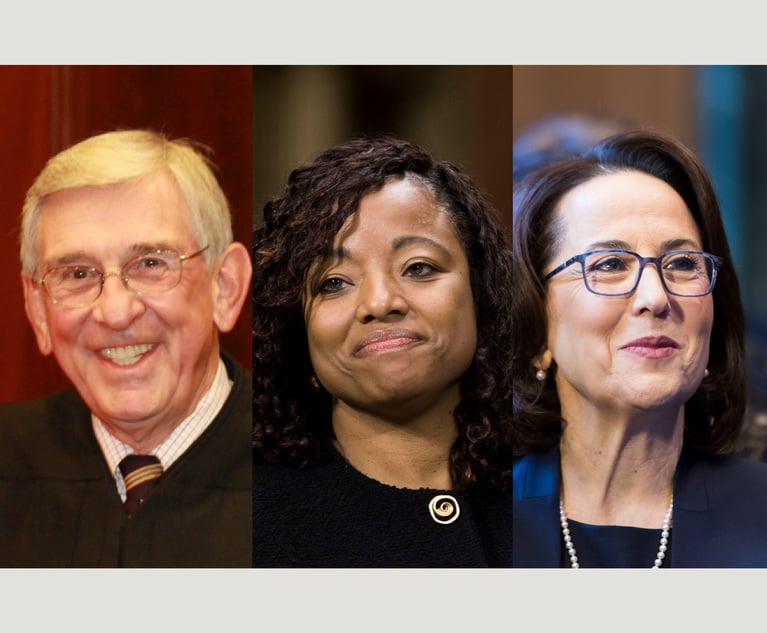Hogan's Katyal Aims to End the Death Penalty in Arizona SCOTUS Case
A Hogan Lovells team is asking the court to decide whether "the death penalty in and of itself violates the Eighth Amendment." A sharp drop in death sentences and executions makes capital punishment "rare and freakish," the brief contends.
August 15, 2017 at 02:54 PM
3 minute read
Former acting U.S. Solicitor General Neal Katyal is hoping that the time is finally right for the U.S. Supreme Court to declare the death penalty unconstitutional again.
Katyal, now a Hogan Lovells partner in Washington, filed a certiorari petition with the court on Monday in an Arizona death-row case, asking the court to decide whether “the death penalty in and of itself violates the Eighth Amendment, in light of contemporary standards of decency.”
If the court grants the case, it will add to the high court's blockbuster docket of upcoming cases for the fall term, on issues ranging from political gerrymandering to President Donald Trump's immigration travel ban.
Katyal is handling the travel ban case, and is playing a major role in an important trio of business cases testing whether labor law can be used to forbid arbitration agreements in employment contracts.
But Katyal has shrugged off the workload, stating he will share and consolidate some of his teaching duties at Georgetown University Law Center, where he is a professor. On Monday, Katyal tweeted that the death-penalty petition is “what we've been up to & why we've been relatively silent for a while. Time to realize the death penalty in practice is a disaster. “
In an interview Katyal said his firm has a long history of significant death-row representations, and “we redoubled our efforts” after Justice Stephen Breyer, joined by Justice Ruth Bader Ginsburg, said in a 2015 dissent that the court should revisit whether the penalty is constitutional.
The Arizona case is titled Hidalgo v. Arizona. The main flaw in the Arizona death-penalty statute, Katyal wrote, is that so-called “aggravating factors” have been added over the years to the point where 99 percent of those who commit first-degree murders are eligible to be executed.
“The Arizona death penalty statute is deeply unconstitutional, as it does not in practice narrow who is subject to the death penalty,” Katyal said, adding that “the death penalty as a whole, after decades of experience, is flatly unconstitutional as well.”
One of Katyal's arguments is that with the sharp drop in death sentences and executions nationwide, capital punishment has become “a rare and freakish punishment” that the Eighth Amendment forbids.
The brief notes that only 31 people were sentenced to death last year, down 90 percent from 20 years before.
Citing Gregg v. Georgia, the 1976 Supreme Court decision that reinstated the death penalty after it was suspended in 1972, Katyal wrote that “Gregg's hope that the punishment of death could be administered rationally and in accord with legitimate penological purposes has proved to be empty, a fatal mistake which this court must now correct.”
As an Arizona legislator, retired Supreme Court justice Sandra Day O'Connor helped draft a reformed state death-penalty law in 1973 that legislators have expanded since.
Dale Baich, an Arizona federal defender and veteran of death-penalty litigation, said, “In 1973, there were six aggravators. Now there are 14 factors.” Baich added, “The time is right for the Supreme Court to take a look at the Arizona death penalty statute.”
This content has been archived. It is available through our partners, LexisNexis® and Bloomberg Law.
To view this content, please continue to their sites.
Not a Lexis Subscriber?
Subscribe Now
Not a Bloomberg Law Subscriber?
Subscribe Now
NOT FOR REPRINT
© 2025 ALM Global, LLC, All Rights Reserved. Request academic re-use from www.copyright.com. All other uses, submit a request to [email protected]. For more information visit Asset & Logo Licensing.
You Might Like
View All
Split 4th Circuit Revives Constitutional Challenge to Child Vaccine Mandate

Censorship or Security Measure? TikTok Ban Pits Civil Liberties Groups Against US Officials

Longtime Baker & Hostetler Partner, Former White House Counsel David Rivkin Dies at 68
2 minute read
Trending Stories
- 1Decision of the Day: Uber Cannot Be Held Vicariously Liable for Driver's Alleged Negligent Conduct
- 2TikTok Law and TikTok Politics
- 3California Supreme Court Vacates Murder Conviction in Infant Abuse Case
- 4New York’s Proposed Legislation Restraining Transfer of Real Property
- 5Withers Hires Lawyers, Staff From LA Trusts and Estates Boutique
Who Got The Work
Michael G. Bongiorno, Andrew Scott Dulberg and Elizabeth E. Driscoll from Wilmer Cutler Pickering Hale and Dorr have stepped in to represent Symbotic Inc., an A.I.-enabled technology platform that focuses on increasing supply chain efficiency, and other defendants in a pending shareholder derivative lawsuit. The case, filed Oct. 2 in Massachusetts District Court by the Brown Law Firm on behalf of Stephen Austen, accuses certain officers and directors of misleading investors in regard to Symbotic's potential for margin growth by failing to disclose that the company was not equipped to timely deploy its systems or manage expenses through project delays. The case, assigned to U.S. District Judge Nathaniel M. Gorton, is 1:24-cv-12522, Austen v. Cohen et al.
Who Got The Work
Edmund Polubinski and Marie Killmond of Davis Polk & Wardwell have entered appearances for data platform software development company MongoDB and other defendants in a pending shareholder derivative lawsuit. The action, filed Oct. 7 in New York Southern District Court by the Brown Law Firm, accuses the company's directors and/or officers of falsely expressing confidence in the company’s restructuring of its sales incentive plan and downplaying the severity of decreases in its upfront commitments. The case is 1:24-cv-07594, Roy v. Ittycheria et al.
Who Got The Work
Amy O. Bruchs and Kurt F. Ellison of Michael Best & Friedrich have entered appearances for Epic Systems Corp. in a pending employment discrimination lawsuit. The suit was filed Sept. 7 in Wisconsin Western District Court by Levine Eisberner LLC and Siri & Glimstad on behalf of a project manager who claims that he was wrongfully terminated after applying for a religious exemption to the defendant's COVID-19 vaccine mandate. The case, assigned to U.S. Magistrate Judge Anita Marie Boor, is 3:24-cv-00630, Secker, Nathan v. Epic Systems Corporation.
Who Got The Work
David X. Sullivan, Thomas J. Finn and Gregory A. Hall from McCarter & English have entered appearances for Sunrun Installation Services in a pending civil rights lawsuit. The complaint was filed Sept. 4 in Connecticut District Court by attorney Robert M. Berke on behalf of former employee George Edward Steins, who was arrested and charged with employing an unregistered home improvement salesperson. The complaint alleges that had Sunrun informed the Connecticut Department of Consumer Protection that the plaintiff's employment had ended in 2017 and that he no longer held Sunrun's home improvement contractor license, he would not have been hit with charges, which were dismissed in May 2024. The case, assigned to U.S. District Judge Jeffrey A. Meyer, is 3:24-cv-01423, Steins v. Sunrun, Inc. et al.
Who Got The Work
Greenberg Traurig shareholder Joshua L. Raskin has entered an appearance for boohoo.com UK Ltd. in a pending patent infringement lawsuit. The suit, filed Sept. 3 in Texas Eastern District Court by Rozier Hardt McDonough on behalf of Alto Dynamics, asserts five patents related to an online shopping platform. The case, assigned to U.S. District Judge Rodney Gilstrap, is 2:24-cv-00719, Alto Dynamics, LLC v. boohoo.com UK Limited.
Featured Firms
Law Offices of Gary Martin Hays & Associates, P.C.
(470) 294-1674
Law Offices of Mark E. Salomone
(857) 444-6468
Smith & Hassler
(713) 739-1250










